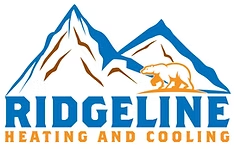How Often Should I Change My HVAC Air Filter?
It's recommended to check your HVAC air filter monthly and replace it every 1 to 3 months. Homes with pets, allergies, or high dust levels may require more frequent changes to maintain optimal air quality and system efficiency.
What Size HVAC System Do I Need for My Home or Business?
The appropriate HVAC system size depends on various factors, including the square footage of your space, insulation quality, ceiling height, and local climate. A professional load calculation by Ridgeline Heating and Cooling can determine the optimal system size for your specific needs.
How Often Should My HVAC System Be Serviced?
To ensure peak performance, it's advisable to have your HVAC system professionally serviced twice a year—once in the spring for cooling and once in the fall for heating. Regular maintenance helps prevent unexpected breakdowns and extends the lifespan of your system.
What Is a SEER Rating, and Why Does It Matter?
SEER stands for Seasonal Energy Efficiency Ratio. It measures the cooling efficiency of air conditioners and heat pumps. A higher SEER rating indicates greater energy efficiency, which can lead to lower utility bills and reduced environmental impact.
Why Is My Home Unevenly Heated or Cooled?
Uneven temperatures can result from various issues, such as blocked vents, dirty filters, inadequate insulation, or an improperly sized HVAC system. A professional assessment can identify and address the root cause to ensure consistent comfort throughout your space.
How Can I Improve Indoor Air Quality?
Improving indoor air quality involves regular filter replacements, using air purifiers, ensuring proper ventilation, controlling humidity levels, and keeping your HVAC system well-maintained. Ridgeline Heating and Cooling offers solutions like iWave and Air Oasis air purification systems to enhance air quality.
What’s the Difference Between a Heat Pump and a Furnace?
A heat pump transfers heat from the outside air to heat your home and can also cool it by reversing the process. It's energy-efficient and ideal for milder climates. A furnace generates heat by burning fuel and is typically more effective in colder climates.
How Long Does an HVAC System Typically Last?
With proper maintenance, most HVAC systems last between 15 to 20 years. Regular servicing, timely repairs, and system upgrades can extend the lifespan and efficiency of your unit.
Can a Smart Thermostat Help Save on Energy Bills?
Yes, smart thermostats optimize heating and cooling schedules based on your habits, leading to energy savings. They allow remote control via smartphones and can provide insights into your energy usage patterns.
Is It Necessary to Clean My Air Ducts?
Over time, air ducts can accumulate dust, debris, and allergens, affecting air quality and system efficiency. It's advisable to have your ducts inspected and cleaned every 3 to 5 years or sooner if you notice dust buildup or musty odors.
Get a quote
Get in touch with us


